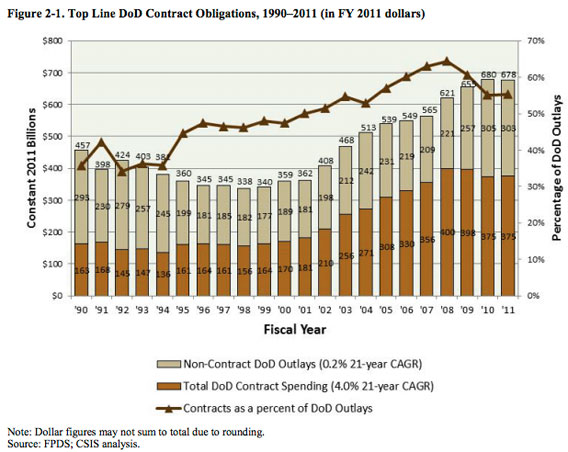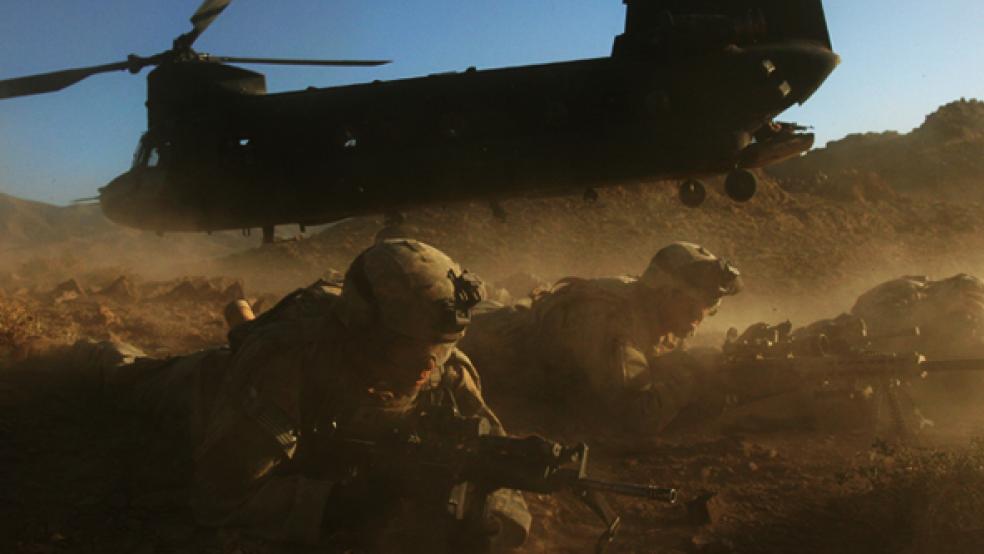
The United States is preparing to withdraw the majority of its troops from Afghanistan next year, ending more than a decade of war that has cost this country hundreds of billion of dollars and 2,126 lives to date.
But the military withdrawal does not mean the United States is out of the country entirely. The country is leaving tens of thousands of contractors behind.
According to the latest contractor census performed by the industry group Professional Overseas Contractors, there are currently 110,404 contractors still working in Afghanistan. Of these, 33,444 are Americans. The rest are either Afghan or from another country.
These workers do everything from serve food to cut hair to provide security. They outnumber U.S. troops by nearly 40,000. For every one American soldier, there are 1.46 contractors.
The vast majority of these contractors are in the private security business, working for the State Department to protect diplomats. This means they are armed to kill on behalf of the U.S. government.
Once the military leaves completely, these contractors will be responsible for training Afghan police and troops, building Afghan infrastructure, conducting development projects, and protecting workers. Under the terms of the Afghan-American strategic partnership agreement signed last summer, just a small number of U.S. troops are going to remain in the country until 2024. Much of the work currently being done by the military will be left to contractors to complete .
“It’s a de facto army, a de facto military presence there. They are a de facto logistic and supply chain,” Malou Innocent, a foreign policy analyst at the Cato Institute, told The Fiscal Times. “We’re going to be relying on contractors across the board. They will be doing all of the things that go into nation building.”
MONEY SPENT QUIETLY
Federal agencies do not publicly release the amounts they spend on contracting related to the war effort. But DOD, USAID, and the State Department all use private contractors to perform various critical services.
According to an analysis by the Center for Strategic and International Studies, DOD spent $375 billion on contracts in 2011, up from $163 billion in 2000. “Between 2001 and 2011, dollars obligated to contract awards by DOD more than doubled, and contract spending outpaced growth in other DOD outlays,” CSIS found.

The State Department and USAID also have experienced dramatic increases in contract spending over the last decade. In 2000, USAID spent just $1.6 billion on contracts – but $9 billion in 2011. The State Dept. contracted just $700 million in 2000, with $4 billion in contracts awarded in 2011.
HISTORY LESSON
If the U.S. experience after the Iraq War is any guide, the number of contractors and the size of contract budgets are not going to get smaller. If anything, the numbers will grow as contractors take on more and more work once done by the military.
The United States completed its withdrawal from Iraq in 2011. At the height of the war, there were more than 150,000 contractors there. Some 8,500 remain today, including 2,356 Americans.
“In Iraq, at its peak, we had at least as many, sometimes many more contractors as we did troops in battle areas,” said Stephen Schooner, a professor of government contract law at George Washington University. “As the troop level was reduced, the contractors didn’t reduce [their levels] at the same rate and became bigger than the military presence. As we continue to pull troops out of Afghanistan, I would assume that there would continue to be that inverse relationship.”
Contractors also provide a cost-effective solution to solving security problems abroad. Maintaining a volunteer force is an expensive task. Troops have to be housed, trained, fed and cared for, just not after the war but as they age. These kinds of costs are the main driver behind Pentagon long-term spending growth.
With private contractors, cost is not as much of a concern. The contractors are fed, housed and insured by their employers--not by the government. And they can operate outside of the strict rules of the military. According to Malou Innocent, the lack of regulations combined with American war weariness creates an environment where these private soldiers can operate with little oversight.
“There’s war fatigue. Americans are focused on the economy. Obama was right when he said they want to do nation building at home, not abroad,” she said. “Americans have largely turned against the war. They understand it’s a conflict that won’t be won in a cost-effective manner.”





